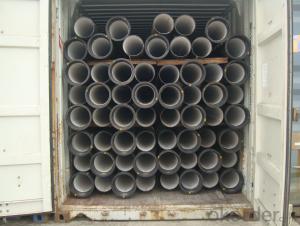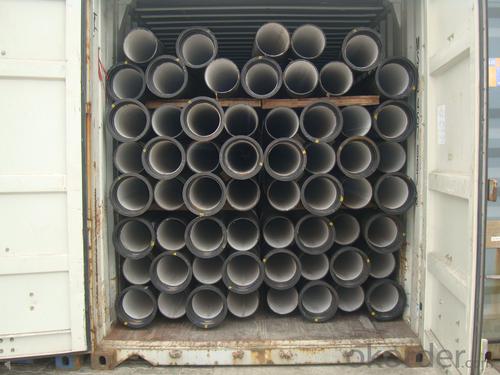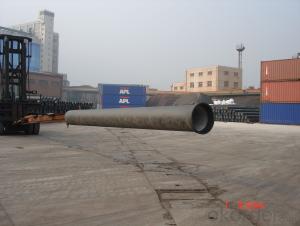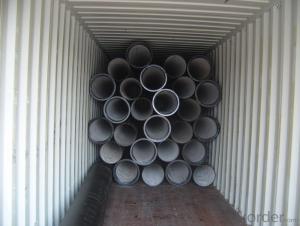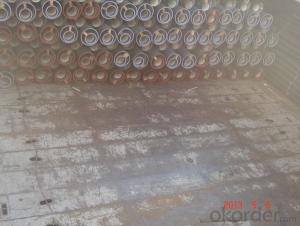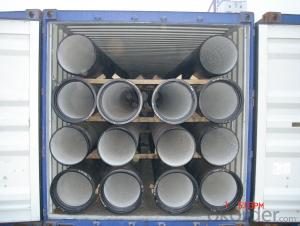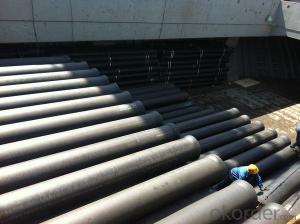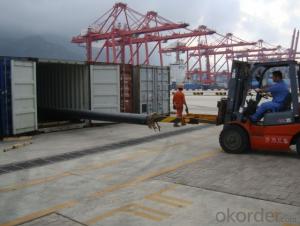DUCTILE IRON PIPE AND PIPE FITTINGS C CLASS DN80
- Loading Port:
- Tianjin
- Payment Terms:
- TT OR LC
- Min Order Qty:
- 23 pc
- Supply Capability:
- 3000 pc/month
OKorder Service Pledge
OKorder Financial Service
You Might Also Like
· Material : Ductile Cast Iron
· Size Range : DN 80mm to DN 2000mm
· Unit Effective Length : 6m or 5.7m
· Manufacture Standard: ISO 2531:1998/ EN 545:2006/EN 598:2007
· Annual capacity : 200,000 tons
· Coating Exterior: Zinc 130g/m2 according to ISO 8179-1 and bitumen coating 70 microns.
· Cement Interior: Portland Cement/ High Alumina Cement/ Sulphate Resisting Cement Lining according to ISO 4179
· Special requirements on external coating and internal lining can be applied
· We also provide accessories such as SBR/EPDM rubber gaskets, lubricant paste, pipe caps, PE sleeves, etc.
Additional Parts:
Each pipe is strictly inspected according to related standard to ensure permanently high performance.
Easy Installation at site and service free for life
Long Service Lifespan
Quotation will arrive you within 24hours once we get your inquiry.
We guarantee offering you a competitive price.
A copy of original inspection reports of pipes will be offered after shipment.
Photos of loading process will be sent to the customer after shipment effect.
We will follow-up the delivery progress after shipment effect and update to the customer on weekly basis.
- Q: Can ductile iron pipes be used for underground fuel storage systems?
- Yes, ductile iron pipes can be used for underground fuel storage systems. Ductile iron is a type of cast iron that possesses superior strength, durability, and flexibility compared to traditional cast iron pipes. These properties make ductile iron pipes suitable for various applications, including underground fuel storage systems. Ductile iron pipes are resistant to corrosion, which is essential for underground storage systems that may come into contact with various fuels and chemicals. Additionally, their high tensile strength and resilience allow them to withstand external pressure and loading, ensuring the integrity and safety of the underground storage system. Furthermore, ductile iron pipes have a long lifespan, typically lasting for several decades, making them a cost-effective choice for underground fuel storage systems. They can handle the weight of the stored fuel and any potential ground movements, maintaining the structural integrity of the system over time. However, it is important to note that the suitability of ductile iron pipes for underground fuel storage systems may also depend on other factors, such as local regulations, soil conditions, and the specific fuel being stored. It is always recommended to consult with professionals and adhere to applicable guidelines when designing and installing such systems to ensure compliance and safety.
- Q: How are ductile iron pipes protected against external corrosion?
- Ductile iron pipes are protected against external corrosion through a combination of manufacturing processes and external coatings. The first line of defense is the inherent corrosion resistance of ductile iron itself. The iron is treated with a special alloying element, typically magnesium, which forms a protective layer on the surface of the pipe. This layer acts as a barrier against corrosion and helps to extend the lifespan of the pipe. In addition to the corrosion-resistant properties of the iron, ductile iron pipes are also externally coated with protective materials. One common method is to apply a layer of asphaltic or bituminous coating to the pipe's surface. This coating acts as a barrier against moisture and corrosive substances in the soil, preventing them from coming into contact with the iron. It also provides a layer of insulation, reducing the likelihood of galvanic corrosion. Another method of external corrosion protection is the use of fusion-bonded epoxy (FBE) coatings. FBE is a thermosetting resin that is applied to the surface of the pipe and then heat-cured to form a strong and durable coating. This coating provides excellent resistance against corrosion, abrasion, and impact, making it a popular choice for ductile iron pipes in harsh environments. In some cases, additional protective measures such as cathodic protection systems may be employed. These systems use electric currents to counteract the corrosion process by supplying electrons to the pipe's surface. This helps to prevent corrosion from occurring, especially in areas where the coating may have been damaged or compromised. Regular maintenance and inspection are also crucial in ensuring the long-term protection of ductile iron pipes against external corrosion. This includes periodic cleaning, repair of any coating damages, and monitoring the integrity of the protective layers. Overall, the combination of the inherent corrosion resistance of ductile iron, external coatings, and maintenance practices ensures that ductile iron pipes are well-protected against external corrosion, allowing them to have a longer lifespan and deliver reliable performance in various applications.
- Q: Are ductile iron pipes resistant to microbiologically induced corrosion?
- Yes, ductile iron pipes are generally resistant to microbiologically induced corrosion (MIC). Ductile iron is a type of cast iron that has been treated with magnesium to give it increased strength and flexibility. This treatment creates a protective layer on the surface of the iron, making it less susceptible to corrosion caused by microorganisms. MIC occurs when certain types of bacteria, fungi, or other microorganisms interact with the metal surface of pipes and produce corrosive byproducts. However, ductile iron is generally resistant to MIC because the protective layer formed during the manufacturing process acts as a barrier, preventing microorganisms from directly contacting the metal surface. Additionally, ductile iron pipes are often lined with cement mortar or other protective coatings, which further enhance their resistance to corrosion. These linings provide an additional layer of protection against microorganisms, reducing the potential for MIC. Despite these inherent resistance properties, it is important to note that the resistance to MIC can vary depending on the specific conditions and environment in which the pipes are installed. Factors such as water quality, temperature, and the presence of certain microorganisms can influence the susceptibility of ductile iron pipes to MIC. Therefore, it is essential to consider these factors and take appropriate measures to prevent MIC, such as regular monitoring of water quality, proper maintenance, and the use of corrosion inhibitors or biocides when necessary.
- Q: What is the expected fatigue life of ductile iron pipes under cyclic loading?
- The expected fatigue life of ductile iron pipes under cyclic loading can vary depending on various factors such as the material properties, design considerations, loading conditions, and maintenance practices. However, ductile iron pipes are generally known for their excellent fatigue resistance, and when properly designed and installed, they can have a long fatigue life of several decades or more.
- Q: What are the typical joint sealing requirements for ductile iron pipes?
- When sealing joints in ductile iron pipes, two common methods are typically used: rubber gaskets and mechanical joints. Rubber gaskets are frequently chosen for their reliability and flexibility. They are typically made of synthetic rubber materials that are resistant to water, chemicals, and other environmental factors. On the other hand, mechanical joints are also commonly used for sealing joints in ductile iron pipes. These joints utilize a mechanical device to connect the pipes and create a watertight seal. They are designed to allow for some movement and flexibility, which is particularly important in areas prone to ground movement or settlement. In addition to using rubber gaskets or mechanical joints, it is crucial to properly clean and prepare the pipe surfaces before joining them. This involves removing any dirt, debris, or old joint material from the pipe ends to ensure a secure seal. Following the manufacturer's instructions, the joint should be assembled, ensuring that the gasket or mechanical joint is correctly positioned and tightened to the recommended torque. In summary, the typical requirements for sealing joints in ductile iron pipes involve the use of rubber gaskets or mechanical joints, thorough cleaning and preparation of the pipe ends, and adherence to the manufacturer's assembly instructions. These requirements are essential to achieve a durable and watertight joint that can withstand the pressures and environmental conditions commonly encountered in ductile iron pipe systems.
- Q: Can ductile iron pipes be used for underground compressed air systems?
- Yes, ductile iron pipes can be used for underground compressed air systems. Ductile iron pipes have high strength and durability, making them suitable for various applications including underground installations. They are corrosion-resistant, which is essential for underground systems where moisture and other environmental factors can cause damage over time. Additionally, ductile iron pipes have the ability to withstand high pressure, making them a reliable choice for compressed air systems. However, it is important to ensure that the pipes are properly installed, with proper support and protection to prevent damage or leaks. Regular maintenance and inspection should also be conducted to ensure the longevity and efficiency of the underground compressed air system.
- Q: What are the differences between cast iron pipes W and A?
- W type socket cast iron drainage pipe made of stainless steel flexible clamp connection in the construction of the installation; A type cast iron drainage pipe with flexible flange and sealing ring connection in the construction of the installation; B type cast iron drainage pipe comprehensive advantages of W type and A type cast iron drainage pipe, straight pipe part adopts W type bearing mouth of pipe, pipe fittings with double flange structure;
- Q: How are ductile iron pipes protected against erosion caused by high-velocity flow?
- Ductile iron pipes are protected against erosion caused by high-velocity flow through various methods and techniques. One common method is the application of protective coatings on the inner surface of the pipes. These coatings create a barrier between the flowing water and the pipe material, reducing the abrasive effects of the high-velocity flow. The coatings used may include epoxy, polyurethane, or cement-mortar lining, depending on the specific requirements of the application. Additionally, manufacturers often design the pipes with increased wall thickness in areas that are prone to erosion, such as bends or areas where the flow velocity is highest. This extra thickness provides additional strength and resistance against erosion. Another technique used to protect ductile iron pipes from erosion is the implementation of flow control devices, such as flow deflectors or velocity-reducing fittings. These devices help to redirect the flow and reduce its velocity, thereby minimizing the impact on the pipe walls. Regular maintenance and inspections are also crucial in preventing erosion. By monitoring the condition of the pipes and identifying any signs of erosion early on, appropriate measures can be taken to address the issue before it escalates. This may involve repairing or replacing damaged sections of the pipes, as well as implementing erosion control measures such as sediment filters or flow restrictors. Overall, a combination of protective coatings, design considerations, flow control devices, and proactive maintenance strategies are employed to ensure that ductile iron pipes are adequately protected against erosion caused by high-velocity flow.
- Q: How is ductile iron pipe different from other types of pipes?
- Ductile iron pipe differs from other pipe types in several ways. To begin with, its exceptional strength and durability are well-known. It is composed of a unique combination of iron, carbon, and other alloying elements, giving it superior mechanical properties compared to other pipes. Consequently, ductile iron pipe is highly resistant to external forces and pressure, making it ideal for underground installations, water mains, and sewer systems. Moreover, ductile iron pipe exhibits excellent corrosion resistance. Typically, it is lined with cement mortar or an internal coating, which acts as a protective barrier against corrosion and lengthens the pipe's lifespan. This makes ductile iron pipe particularly suitable for transporting water and other fluids, as it prevents contamination and maintains the material's quality. Additionally, ductile iron pipe offers a high level of flexibility. Unlike more rigid pipe materials such as cast iron, ductile iron pipe can withstand moderate deflection and ground movement without fracturing or breaking. This flexibility reduces the risk of failure and decreases the need for expensive repairs or replacements. Finally, ductile iron pipe is relatively easy to install and maintain. Usually, it is available in long lengths, minimizing the number of joints required. Furthermore, its mechanical properties and corrosion resistance make it less prone to damage during installation or operation, resulting in lower maintenance costs over time. In conclusion, ductile iron pipe stands apart from other pipes due to its exceptional strength, corrosion resistance, flexibility, and ease of installation. These characteristics make it a reliable and cost-effective choice for various applications, particularly in the water and wastewater industry.
- Q: How do ductile iron pipes handle ground movement due to tree roots?
- Ductile iron pipes are known for their strong and durable nature, making them highly resistant to ground movement caused by tree roots. The flexibility of ductile iron allows it to withstand the pressure exerted by growing tree roots without fracturing or breaking. This is due to the material's ability to absorb and distribute stress, which helps to minimize the impact of ground movement. Moreover, ductile iron pipes have a smooth inner surface that minimizes the chances of tree root intrusion. The tightly sealed joints between the pipes also prevent roots from penetrating and causing damage. In instances where tree roots do manage to penetrate the soil and come into contact with ductile iron pipes, their resistance to corrosion provides an added advantage. Ductile iron pipes are coated with a protective layer that prevents the formation of rust and corrosion, ensuring their longevity and structural integrity. However, it is important to note that while ductile iron pipes are highly resistant to ground movement caused by tree roots, regular inspection and maintenance are still recommended. This allows for early detection and necessary repairs to be carried out if any root intrusion or damage is identified.
Send your message to us
DUCTILE IRON PIPE AND PIPE FITTINGS C CLASS DN80
- Loading Port:
- Tianjin
- Payment Terms:
- TT OR LC
- Min Order Qty:
- 23 pc
- Supply Capability:
- 3000 pc/month
OKorder Service Pledge
OKorder Financial Service
Similar products
Hot products
Hot Searches
Related keywords
